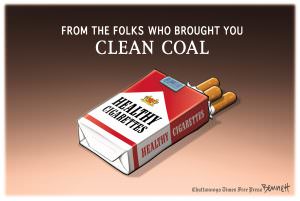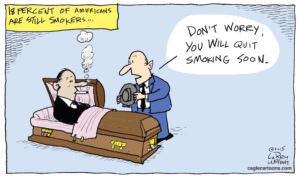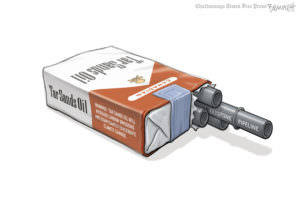Death by Fuchsia and Teal
Democrats in Congress are right to go after tobacco companies like Camel, which is marketing a new line of cigarettes to younger women.WASHINGTON — It turned up in the news just as the blooms on Valentine’s Day flowers were drooping down — an ornate image with hints of Victorian romance in the swirls of buds and stems that embraced the objects of desire: Camel cigarette packs.
“Light & luscious,” the magazine advertisement for R.J. Reynolds’ new version of Camels declares. These are odd and outright deceptive words to describe a noxious blend of carcinogens that not only cause disease and death but stink when lit. Still, Reynolds is pushing its new woman-friendly Camel product as if it were as enticing as a whiff of Chanel perfume: Camel No. 9, it’s called. Its package is black, and trimmed in “fuchsia” and “teal,” the company’s chosen words for its version of pink and blue.
This is your killer habit on Kate Spade.
Big Tobacco has never been subtle about marketing cigarettes to women. It has exploited women’s concerns about their weight (“Reach for a Lucky instead of a sweet,” it urged in the 1920s) and sought to capitalize on their newfound sense of emancipation (“You’ve come a long way, baby,” it declared in the late 1960s). Secret industry documents unearthed in the 1998 settlement of state lawsuits against major tobacco companies revealed that women smokers don’t necessarily want to quit, “yet they are guilt-ridden with concerns for their families if smoking should badly damage their own health,” according to a Philip Morris Co. memo cited by researchers at the Harvard School of Public Health. Hence, “light” and “low-tar” cigarettes are aggressively marketed to women, though they are just as likely to make you sick as regular blends.
Indeed, so deceptive is the use of the word light to promote cigarettes that U.S. District Judge Gladys Kessler, ruling in the huge racketeering lawsuit the Justice Department won against the industry last year, ordered that tobacco companies stop using in their marketing terms including light, ultra light, mild and natural. The industry’s response? “There is a stay on what her findings were,” Craig Fishel, communications manager for R.J. Reynolds, told me in an interview.
“There’s nothing new in the universe of tobacco companies,” says Ellen Vargyas, general counsel of the American Legacy Foundation, an anti-smoking organization funded with money the industry was forced to pay in settling the state lawsuits.
Ah, but there is something new on Capitol Hill — Democratic control of both houses of Congress. As it happens, just as Camel No. 9 is hitting the stores, lawmakers in both parties are at last poised to hit back.
They are reintroducing measures to have the Food and Drug Administration regulate the industry — legislation that would explicitly give the FDA the power to stop tobacco company marketing practices that target children and mislead the public. The measure has passed the Senate twice before, only to be blocked in the House when that chamber was controlled by Republicans. Now Reps. Henry Waxman, D-Calif., and Tom Davis, R-Va., already have 98 co-sponsors, and House hearings (there were none on tobacco regulation during the 12 years of Republican control) are expected next month.
Attributes of the Camel No. 9 marketing scheme that might run afoul of such future regulation are its use of the word light and its reliance on advertising in women’s magazines such as Glamour, which often is read by teenage girls. “Companies can say it is for adult women, but look at the pink and look at the use of the word light,” said a senior House aide who works on tobacco issues.
R.J. Reynolds insists that everything about Camel No. 9 is not only perfectly legal but perfect for women: The brand “better represents their taste preference and style,” to use Fishel’s words.
Legal, perhaps. But morally indefensible.
Lung cancer is the leading cause of cancer deaths among women, surpassing deaths from breast cancer and gynecological cancers. Some research suggests that the presence of estrogen may have a role in triggering lung-cancer tumors. Would society support corporate interests whose products deliberately — and deceptively — urged women to give themselves breast cancer? No one buys that bit of nonsense. Yet according to The New York Times, Wall Street is cheering as innovative marketing the campaign to sell Camel No. 9.
Anything is possible, I suppose, if you believe that death is more attractive when accessorized in fuchsia and teal.
Marie Cocco’s e-mail address is mariecocco(at symbol)washpost.com.
Copyright 2007, Washington Post Writers Group
Your support matters…Independent journalism is under threat and overshadowed by heavily funded mainstream media.
You can help level the playing field. Become a member.
Your tax-deductible contribution keeps us digging beneath the headlines to give you thought-provoking, investigative reporting and analysis that unearths what's really happening- without compromise.
Give today to support our courageous, independent journalists.





You need to be a supporter to comment.
There are currently no responses to this article.
Be the first to respond.